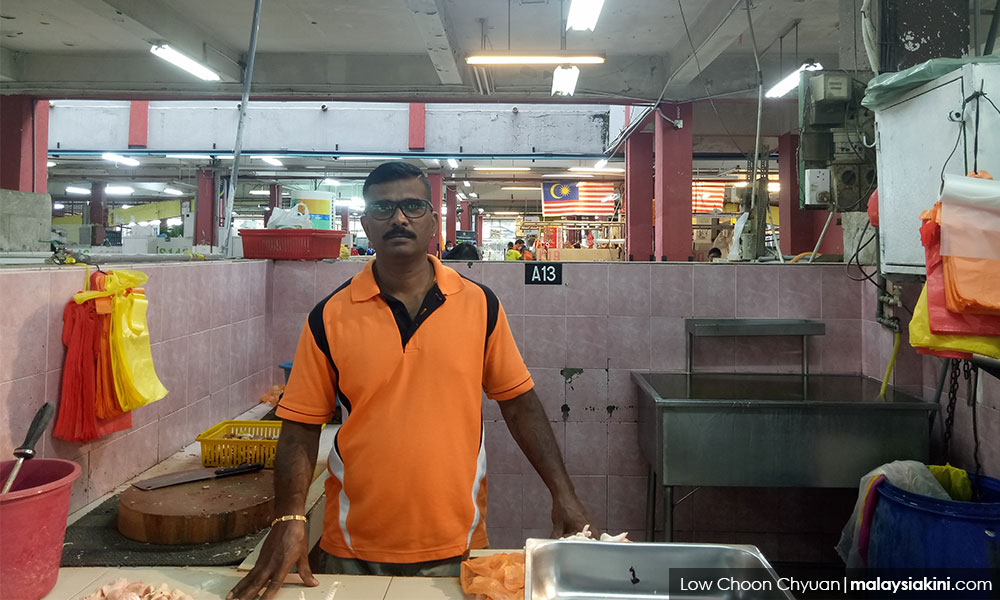Bukit Gasing assemblyperson Rajiv Rishyakaran has urged the Selangor state government to allow foreign spouses to work in their partner's hawker stalls.
Rajiv (photo, above) said that several hawkers from Petaling Jaya contacted him as their foreign spouses are not allowed to work in their stalls.
The spouses are considered non-citizens by the Petaling Jaya City Council (MBPJ)s non-citizens even though they are permanent residents who hold red identification cards.
According to Rajiv, six hawkers from PJ Section 14 and PJ Oldtown wet market sought his assistance.
When Malaysiakini visited a market in Petaling Jaya, a stall owner known as Becky (pseudonym) said that her husband, who holds a red identification card, has been living in Malaysia for more than 30 years.
Becky was married to him for 19 years, and they have four children. For the past 17 years, they have been managing the business in the market.
However, two months ago, when the enforcement agencies began to carry out stricter actions, in fear of getting a penalty, Becky's husband was forced to stop helping at the stall.
Ever since then, Becky's life has been strongly affected as her husband is not allowed to work, and she has to look after the stall business, the children and housework.
She described her life becoming disorganised, and she is always late to open her business in the morning.
"I have to take care of the stall on my own, rushing when I go to eat or go to the toilet. As the owner, of course, I will be worried (when nobody is looking after the stall)."
Hard to manage hawker business alone
PJ Oldtown market association deputy president N Rajaratnam told Malaysiakini that the market has at least 10 hawkers who face similar problems as Becky.
He also complained that market owners are not allowed to slaughter chickens due to Covid-19, and the market's businesses were strongly affected.

Rajaratnam (photo) added, on top of that decision, foreigners are not allowed to help their spouse, resulting in a lot of trouble for the hawkers.
Rajiv explained that the hawker license approved by the Selangor government stated that foreigners are not allowed to work in hawkers, and MBPJ's enforcement actions are based on this regulation.
Rajiv noted that married couples operate many of the stalls where one of them cooks, and the other serves the customers.
If the foreign spouse is not allowed to work, a hawker owner will have difficulty operating the business on their own. Hence, their family income will be impacted.
Besides, many hawkers are incapable of hiring workers.
According to Rajiv, net profit for a hawker for a day is around RM50 to RM100, while hiring a local worker costs RM80 per day.
Workers can be substituted, spouses can't
While noting that migrant workers are not allowed to work in hawker stalls, Rajiv claimed that foreign spouses are special cases where the state government should be flexible.
"I would say it is a special case for married couples, because this is a family, although their spouses came from different countries."
"She is not here for one, two months or one year. She is here for the rest of her life."
"Workers can be changed, Indonesians or Bangladeshi, you can change to Malaysian workers, but you can't change your spouse."
Amend hawker license rules
Rajiv suggested that the Selangor government should amend the condition of hawker licenses to only limit "foreign workers" and allow foreign spouses to assist their partners.
Rajiv said that he had appealed to the Selangor Menteri Besar Amirudin Shari and Entrepreneur Development, Rural, Village and Traditional Village exco Rodziah Ismail to amend the regulations.
"They didn't say no. They are considering it."
"I have appealed to menteri besar as well as the exco for small entrepreneur, Rodziah, to review the wordings (of the license conditions), to exempt for spouses (to work in their husband or wife's hawker stalls)."
When asked, Rodziah explained that foreign spouses are not allowed to work in the hawker stalls, they are allowed to assist but only when the husband or wife is around.
"Can help, but not as a worker. They can help to organise things or deliver things."
She stressed that as a helper, it means that the foreign spouses should not be a worker who assists the business regularly, but only occasionally.
She explained that the enforcement agencies would decide whether they are a helper or a worker of the hawker.
Malaysiakini is seeking Amirudin's response on this matter. - Mkini




No comments:
Post a Comment
Note: Only a member of this blog may post a comment.